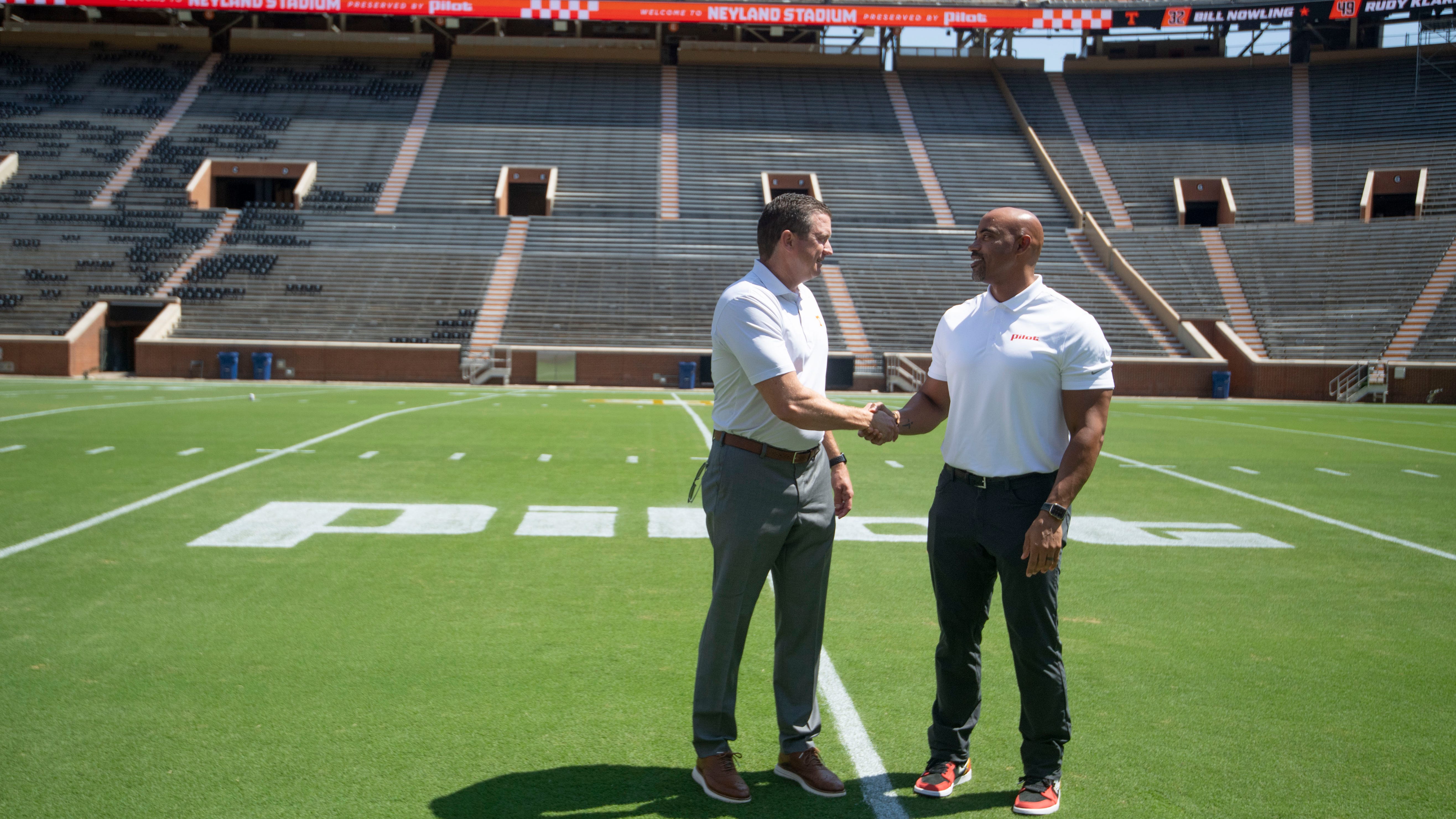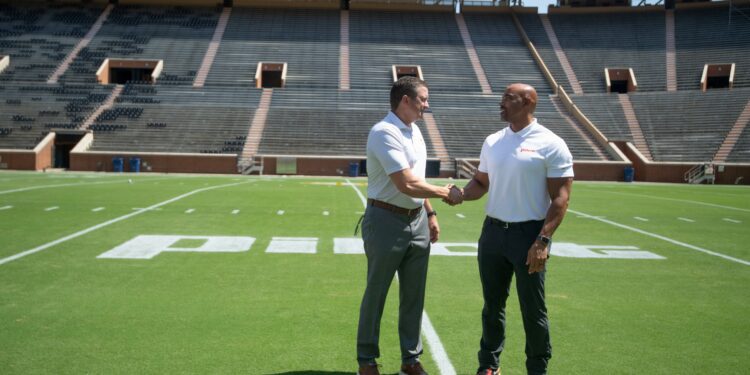
Tennessee announces branding partnership with Pilot for Neyland Stadium
Tennessee announces a branding partnership with Pilot for Neyland Stadium Tuesday.
Neyland Stadium is the second University of Tennessee sports facility to add a corporate sponsor in the past year.
Last August, UT’s basketball arena became Thompson-Boling Arena at Food City Center.
On Tuesday, Neyland Stadium got the tagline “Home of the Vols. Proudly preserved by Pilot,” while keeping its iconic name.
So is Lindsey Nelson Stadium, where the defending national champions play baseball, the next to get a corporate sponsor?
“We have a lot of different assets that provide a ton of value for corporate naming opportunities,” UT athletics director Danny White said. “(Lindsey Nelson Stadium) could be one of them. But there’s a bunch.
“We’re always looking to generate as much revenue as we can. But, again, we’ll also be good stewards of Tennessee tradition.”
TENNESSEE, PILOT STRIKE DEAL Neyland Stadium branding rights — but iconic name remains
Who is Lindsey Nelson Stadium named after?
UT has long considered selling naming or branding rights for Lindsey Nelson Stadium.
In June 2023, the UT Board of Trustees approved a renovation budget of $95.8 million that includes projected revenues to address the costs. Among the projected revenues was nearly $8 million for naming rights, but UT has not stipulated the details of that plan.
UT’s baseball stadium is named after the late legendary broadcaster Lindsey Nelson, who graduated from and started working for UT in the late 1930s. The Columbia, Tennessee, native, started the Vol Radio Network in 1949 and worked in sports information in the 1950s.
Nelson, who died in 1995 at 76, is a member of the Baseball Hall of Fame and the Pro Football Hall of Fame among his many hall of fame honors. He broadcasted events including the World Series, the Rose Bowl, the Masters and NBA championships.
Why Food City Center and Pilot branding are different
UT has been astute in adding corporate brands to its stadiums, judging each situation differently.
It sold part of the name of Thompson-Boling Arena to Food City.
That facility was named after B. Ray Thompson Sr., who donated $5 million in 1982 toward the arena’s construction, and former UT President Dr. Edward J. Boling. Those were important figures for the facility, but they weren’t iconic coaches or players.
But UT didn’t touch the name of the basketball court, The Summitt, named after legendary Lady Vols coach Pat Summitt.
Likewise, Pilot didn’t intrude on the name of Neyland Stadium. It is named after Gen. Robert Neyland, the legendary Vols football coach.
That was a no-brainer for UT and Pilot, which would’ve faced a backlash from fans if Neyland’s name was replaced.
“Gen. Neyland deserves to have a stadium named after him for his service to our country, his great courage, his winning tradition,” Pilot CEO Adam Wright said. “It was a non-starter for us to even contemplate changing the stadium name.”
Shields-Watkins Field also kept its name on the Vols football field. It was named after William Simpson Shields, the UT trustee who helped secure the land for the football field in 1919, and his wife Alice Watkins.
Pilot logos are displayed on the field and stadium. But the company name doesn’t get equal billing to Neyland, as Food City did on the basketball arena.
White said the Pilot and Food City deals were being negotiated around the same time, but that’s where the similarities stopped.
“They are very different buildings with very different histories,” White said.
Would UT drop Lindsey Nelson from stadium name?
So that raises the question about where Lindsey Nelson fits into that spectrum of UT names.
Nelson certainly ranks below Neyland and Summitt, whose names were untouched on sports facilities. But he’s probably more recognizable than Thompson and Boling, whose names now share space on the basketball arena.
Of course, revenue will drive the conversation for the Lindsey Nelson Stadium naming or branding rights, just as it did the other corporate partnerships.
Thompson-Boling Arena will undergo an $85 million makeover. The 10-year, $20 million naming rights deal with Food City will help that project.
The Pilot agreement will extend up to 20 years. Knox News requested financial terms of the agreement, but they were not disclosed. However, White called it a “huge deal” that will help fund the ongoing $337 million renovation to Neyland Stadium.
So UT also could expedite upgrades at Lindsey Nelson Stadium by striking a deal with another corporate sponsor.Whether that means purchasing the naming rights of the stadium or just displaying logos around the facility may depend on the price.
Adam Sparks is the Tennessee football beat reporter. Email [email protected]. X, formerly known as Twitter@AdamSparks. Support strong local journalism by subscribing at knoxnews.com/subscribe.
Get the latest news and insight on SEC football by subscribing to the SEC Unfiltered newsletter, delivered straight to your inbox.
Source link : http://www.bing.com/news/apiclick.aspx?ref=FexRss&aid=&tid=66bca604dc4145abbc9fbefd597eb0e8&url=https%3A%2F%2Fwww.usatoday.com%2Fstory%2Fsports%2Fcollege%2Funiversity-of-tennessee%2Ffootball%2F2024%2F08%2F13%2Flindsey-nelson-stadium-naming-rights-tennessee-baseball-neyland-pilot%2F74724406007%2F&c=8239518020461308122&mkt=en-us
Author :
Publish date : 2024-08-13 07:37:00
Copyright for syndicated content belongs to the linked Source.





